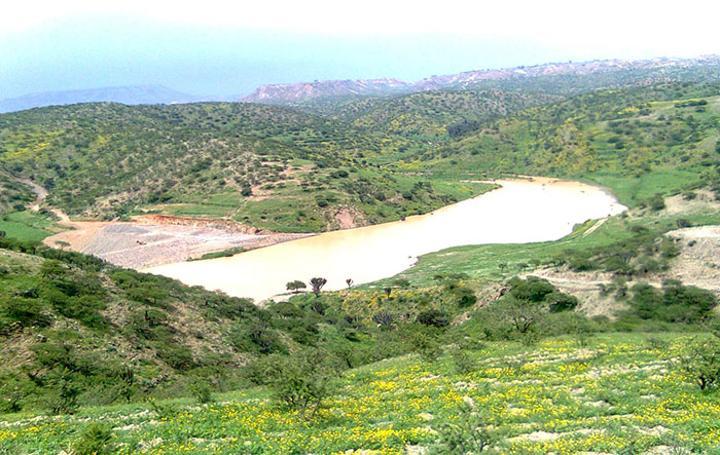Africa-Press – Eritrea. The Ministry of Agriculture (MoA) marked World Desertification and Drought Day, under the theme ‘Her Land, Her Rights,’ on 16th June, at its headquarters in Asmara. Following is an interview with Mr. Semere Amlesom, Director General of the Department of Agricultural Extension at the MoA and National Focal Point for the United Nations Convention to Combat Desertification (UNCCD).
Mr. Semere: UNCCD is one of the three Rio Conventions in addition to the United Nations Convention on Biological Diversity (CBD) and United Nations Framework Convention on Climate Change (UNFCCC). It is the only multilateral environmental agreement that addresses land Issues and has three governing bodies — Conference of Parties (COP), Committee for Reviewing the Implementation of the Convention (CRIC), and Committee for Science and Technology (CST). It works closely with the Global Mechanism (GM) and the Global Environmental Facility (GEF).
The main mission of the Convention (UNCCD) is to provide a global framework to support the development and implementation of national and regional policies, programmes and measures to prevent, control and reverse desertification/land degradation and mitigate the effects of drought through scientific and technological excellence, public awareness, standard setting, advocacy and resource mobilisation, thereby contributing to poverty reduction.
Mr. Semere: Eritrea signed the UNCCD on 14th October, 1994, and ratified it on 14th August 1996; and holds the objectives of Agenda 21 of the UN. In addition, the MoA revised and aligned its National Action Plan with the UNCCD 10-Year Strategy (2008-2018). This ensures the Government’s commitment and compliance with the UNCCD’s decision (3/COP.8 of 2007) that requires affected country parties “to align their action programmes and other relevant implementation activities relating to the Convention.” UNCCD invited all country parties to “formulate voluntary targets to achieve Land Degradation Neutrality (LDN)” and to incorporate them in UNCCD NAPs. The Government of the State of Eritrea is one of the first country parties to adopt and even to submit the Land Degradation Neutrality Target Setting Program (LDN TSP). This is because it is not an option for Eritrea but a necessity. Moreover, Eritrea reports regularly The PRISE report to UNCCD. For instance, this year’s (2023) report has been submitted to the UNCCD, which is available at its website. Also, the Eritrean National Drought Plan has recently been submitted to the UNCCD.
Mr. Semere: The theme of the 2023 Desertification and Drought Day is “Her Land, Her Rights” and its objectives are:
•Raise awareness of the disproportionate impact of desertification, land degradation and drought on women and girls and the barriers females face in decision-making on land issues;
• Highlight women’s contributions to sustainable land management and broader Sustainable Development Goals (SDGs);
• Mobilize global support to advance land rights for women and girls around the world.
When we come to the Key messages of the day, UNCCD has outlined the following:
• Desertification, land degradation and drought disproportionately impact women and girls, as they often do not have access to and control of land resources. They are most affected by reduced agricultural yields and increased water scarcity.
• In the vast majority of countries, women have unequal and limited access and control to land. In many regions, they remain subject to discriminatory laws and practices that impede their right to inherit, as well as their access to services and resources.
• When women are empowered, entire families and communities benefit. In addition to being on the frontlines of land degradation and climate change impacts, women can also be at the forefront of global efforts to restore land back to health and boost drought resilience. Gender-responsive land restoration is a pathway to reduce poverty, hunger, and malnutrition.
• Investing in women’s equal access to land and associated assets is a direct investment in their future and the future of humanity. Securing women’s land rights can help advance global gender equality and land restoration goals, and contribute to the achievement of broader SDGs.
Mr. Semere: Eritrean women have already achieved equal rights when it comes to acquiring land, access to education, employment and equal pay for equal work. The problem that still persists is the land tenure system, which affects long term investment on land. It affects men and women equally.
In terms of the rehabilitation of degraded land and the development of water resources, the following achievements have been registered.
• Around 207,997 hectares of on-farm and 88,168 hectares of off-farm land has been treated;
• Around 4.6 million meter-cube of check-dams constructed by mobilizing communities, including women;
• 787 small, medium and big dams constructed for irrigation; human and livestock consumption, and inland fish production
• 64 million tree-seedlings planted in catchments, on road sides, public places and on the grounds of schools and government and religious institutions;
• 396, 930 hectares of protected enclosures established, with a plan to expand them to 800,000 hectares;
• 174,000 energy saving stoves manufactured, reducing fuel wood consumption by 50%; and
• 21,000 date palm seedlings planted in different parts of the country.
What is the way forward with regards to combating desertification, land degradation and drought?
Mr. Semere: To address these issues, the Government, as usual, will focus on the following areas: reinforcing community-based development activities to enhance land productivity; constructing all kinds of water holding structures to improve agricultural productivity; installing alternative energy sources to minimize the cutting of trees; raising public awareness about environmental conservation, in general, and tree planting, in particular; shifting from chemical-based or inorganic farming to organic farming by promoting organic fertilizers – mainly compost and bio-pesticides; and finally fostering sub-regional, regional and international engagements through pragmatic investments.
Any final thoughts.
Mr. Semere: As UNCCD put it in this year’s message, governments can help by promoting laws, policies and practices that end discrimination and secure women’s rights to land and resources; businesses can give priority to women and girls in their investments and facilitate their access to finance and technology; and individuals can support women-led initiatives that are restoring land.
Public Relations Division
Ministry of Agriculture
June 16, 2023
For More News And Analysis About Eritrea Follow Africa-Press







